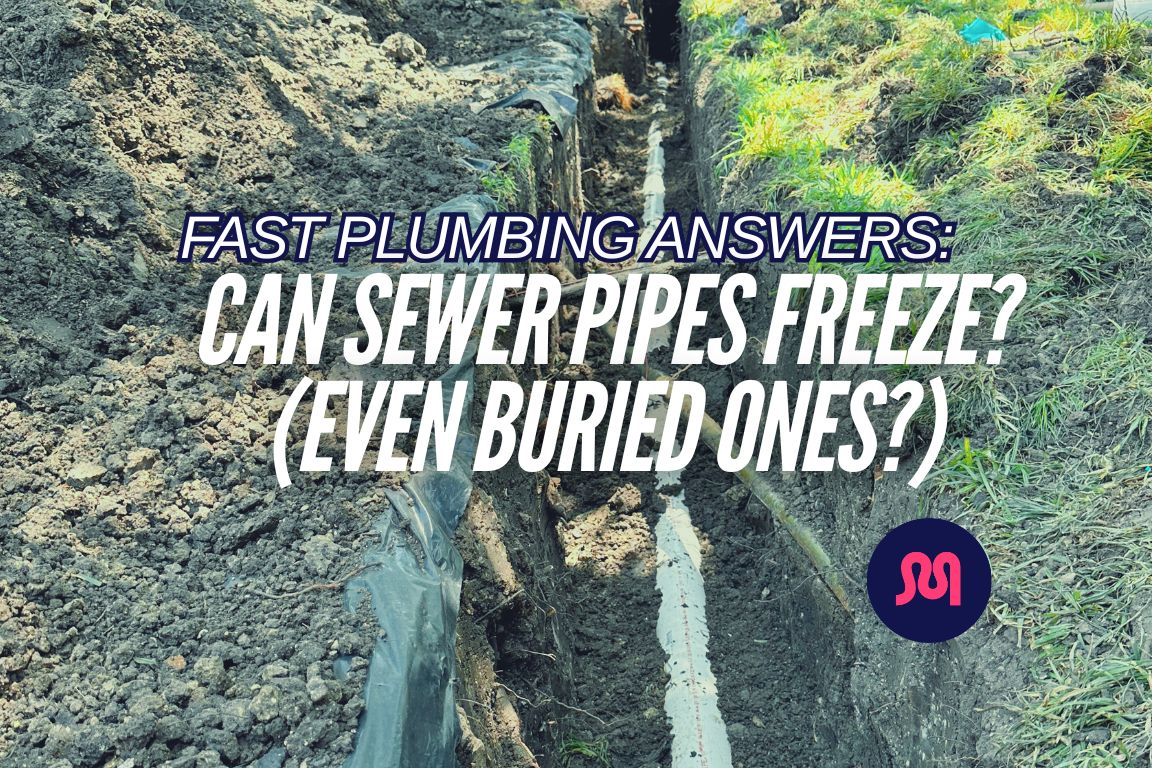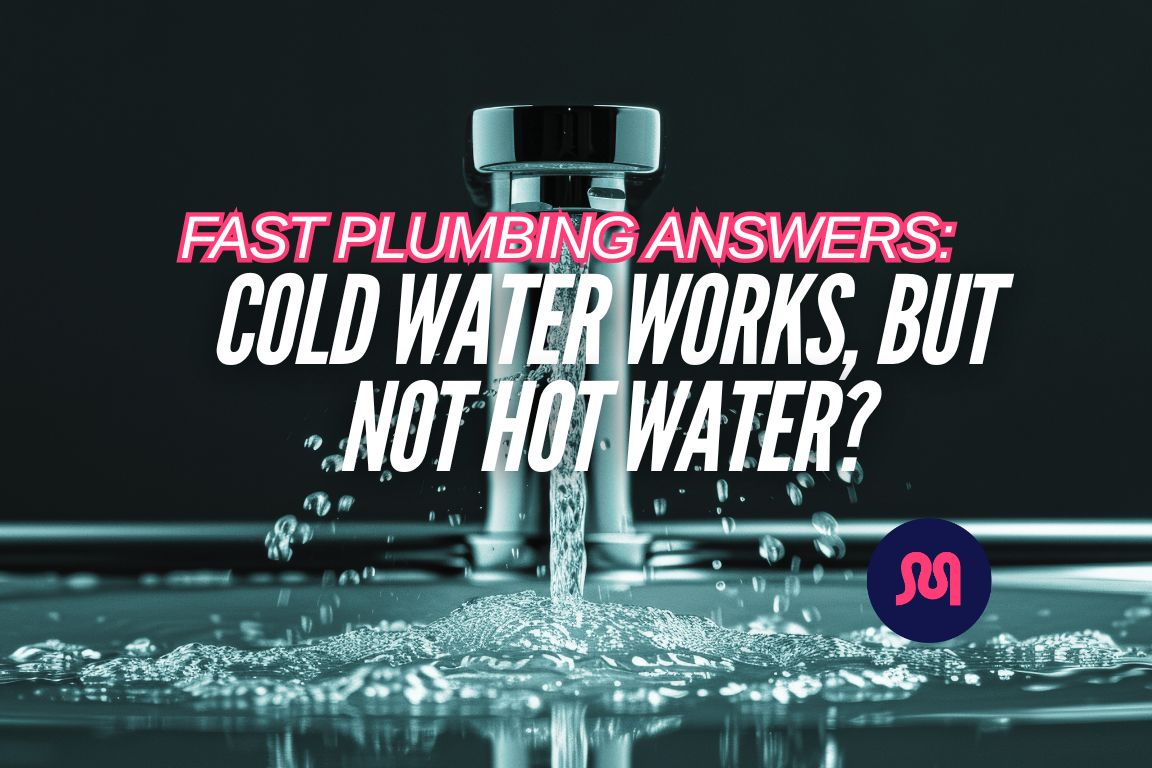DFW Water Heater Repair: The Only Guide You'll Ever Need

table of contents
table of contents
Chances are, you’re not a plumber or HVAC expert. That's okay — our plumbing experts designed this article to cover the most common water heater repair scenarios we hear about from customers. Consider this a comprehensive water heater repair guide you can reference for all your questions.
We’re Mother, a Dallas-Fort Worth plumbing company that provides dependable, hassle-free modern plumbing for homeowners who value quality. If you ever need us, we’re here to provide you long-term plumbing solutions that last.
Let’s give you all the answers you’ll ever need to Dallas-Fort Worth water heater repair. We’ll show you how your tank works, troubleshoot common water heater issues, and tell you how local clay soil, hard water and hot weather affect your system.
Then, we’ll tell you which water heater issues you can DIY, and when you need to call us for help.
{{water-heater-installation="/services/water-heater-installation"}}
Your Water Heater: A Quick, Painless Anatomy Lesson
You heard a rattling noise and went to check the water heater. But one look at your tank, and you’re immediately confused — how does this thing even work?
Let’s take a simple look at your water heater tank, discuss key parts and how gas and electric products differ.
A Simple Explanation of Your Water Heater Tank
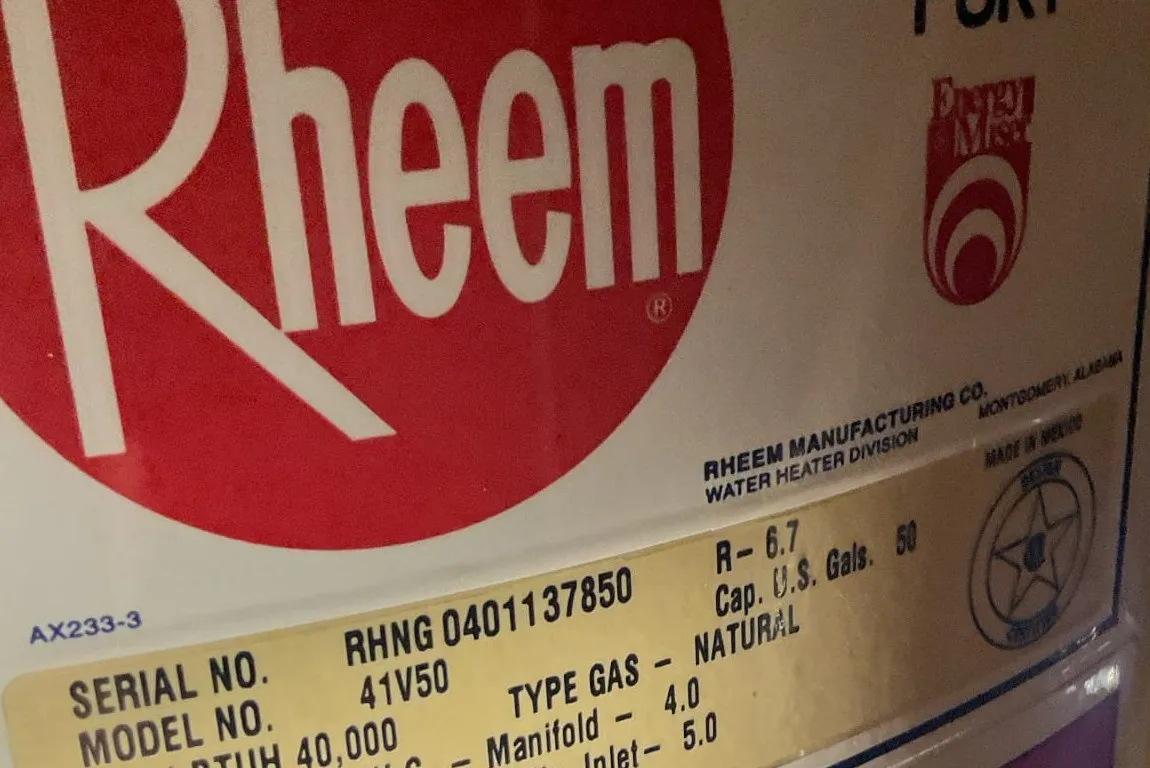
In simple terms, your tank hot water heater has 3 key jobs:
- Storage: A tank to hold water;
- Heating: A heat source (either a flame or heating element); and
- Distribution: Connections to the taps, faucets and water using appliances in your home.
Past this, your unit’s components and parts depend on its fuel source.
Electric and gas water heaters differ wildly in how they heat water, their components, and the way they operate. Here's a breakdown of the major differences.
How gas and electric units heat water
Gas water heaters use natural gas or propane as their primary fuel source. A burner at the bottom of the tank ignites the gas, and transfer that combustion’s heat to the water in your tank through a flue in its center.
Electric water heaters contain one or two electric heating elements immersed directly in the water tank. Electricity flows through these elements to generate heat that warms the surrounding water.
{{electric-vs-gas-water-heaters="/blogs/electric-vs-gas-water-heaters"}}
Gas vs electric: unique water heater components
Here’s a list of 10 common water heater components and how they’re utilized (if at all) in gas and electric water heaters.
Table: Common Components of Gas and Electric Water Heaters
Troubleshooting: Let’s Identify Your DFW Water Heater Problem
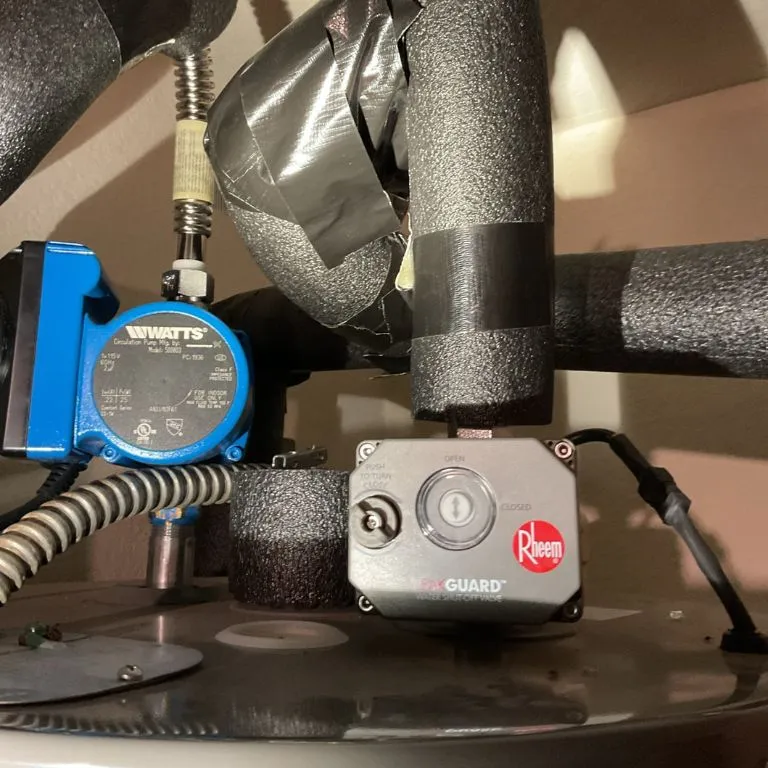
Not getting hot enough water, or is your water way too hot? Did you notice a strange leak? Does your water smell like rotten eggs?
Our research team collected service data from the last 4 years of Mother Modern Plumbing water heater repair projects. We found 6 major water heater issues that caused a majority of these service calls.
Let’s look at the major cues and symptoms of water heater problems in Dallas-Fort Worth homes. Whether you see, hear or smell the problem, call us immediately to resolve the problem.
Water Heater Not Heating
Nothing’s worse than an unintended cold shower. If your water supply isn’t heating properly, it affects virtually every water-using appliance in your home.
The good news: 9 times out of 10, you’re dealing with a simple DIY fix or inexpensive service call.
The Usual Suspects: The primary reason for your water heater not heating depends if you have a gas or electric unit.
If you have a gas water heater, check the pilot light. If it’s out, that’s the problem. If it’s not out, you may have thermocouple failure.
The thermocouple is a safety device that senses if the pilot light is lit. If it's not working, it will shut off the gas supply to the burner.
If it’s an electric water heater, you’re probably dealing with a tripped circuit breaker — check your electrical panel, and reset the breaker if it’s flipped. If it trips again immediately, call a plumber.
If your circuit break is fine, one or both of your heating elements probably failed and you should call a plumber. Reach out to our team to schedule a call.
Water heater not staying hot
You have water that starts hot but loses temperature quickly. Do your showers start hot and end cold, or are you only getting lukewarm water for your hot water laundry loads?
The Usual Suspects: Are you using more hot water than your tank can handle? Consistent, over-long showers and multiple loads of dishes and laundry can drain your water heater’s tank and leave you without a pre-heated supply.
If overuse isn’t the issue, sediment buildup is the likely culprit — especially in North Texas. Minerals in the water can accumulate as sediment at the bottom of the tank. This sediment and mineral scaling separates the heating element from the water.
How old is your water heater? Have you ever flushed it to remove sediment? Need your water heater flushed? Call our team.
Water Heater Leak
The dreaded leaky water heater. Seeing a pool of water on the floor around your tank sets off alarm bells quickly — but not all leaks are created equal.
Turn off the cold water intake immediately. Then, turn off the power or gas to your tank. This allows you to inspect your water heater safely, and stops any further leakage.
Visually inspect the tank closely. Are you dealing with a direct leak from the base? Or is water dripping from other areas of the tank?
{{electric-vs-gas-water-heaters="/blogs/electric-vs-gas-water-heaters"}}
Water heater leaking from base
A leak from your water heater tank’s base usually indicates a more serious internal issue. You’re more likely dealing with corrosion, a crack or system failure — if it was condensation, you wouldn’t have a constant base leak.
The Usual Suspects: Internal corrosion is the most common reason for water heater tank leaks in DFW homes. Mineral buildup and scaling penetrates your tank’s walls over time, leading to small cracks where leaks form.
If you are confident your tank is structurally sound, check the drain valve. A loose connection or cracked valve may be the source of your leak.
Water dripping from water heater
The cause of water dripping from your tank depends on its precise location. Once you’ve shut off the power source and cold water intake, look closely at exactly where the droplets are forming.
The Usual Suspects: The good news? It’s probably just condensation, especially in humid summer conditions. If dripping only occurs after hot water use, and it’s not in large quantities, you probably don’t have to worry.
If the drip is consistent, your temperature and pressure valve (T&P valve) may be leaking. The T&P valve is designed to release excess pressure or temperature. Check that your thermostat isn’t set too high — overheating is a common cause for T&P valve leaks.
You may also have an issue with your main supply line. We recently had a customer whose supply line had a manufacturer’s defect — a faulty O-ring caused her leak.
If you see discoloration, you’re likely dealing with rust and corrosion. While it’s not the most common culprit, check this anyway so you can rule out a more serious internal issue.
Water Heater Water Quality Problems
Does your water look or smell bad? It’s unsettling to see reddish-brown water in your sink, or smell rotten eggs in the dishwasher.
Rusty water
Do you have discolored water that looks red or brown, or smells a bit like metal?
The Usual Suspects: Long-term internal corrosion is usually the cause of rusty water, especially if you have an old tank.
You should also check your anode rod. Anode rods are designed to attract corrosive materials in your tank — over time, it sacrifices itself to keep your water clean. When your anode rod fails, that corrosion stays in your tank.
Hot water smells like rotten eggs
Don’t confuse smelly water with a rust issue. That rotten egg stench in your hot water supply is actually gas caused by bacteria buildup. While the bacteria isn’t a health risk, it sure stinks.
The Usual Suspects: Stagnant water and hot temperatures can cause sulfate-reducing bacteria to form. This bacteria can grow in the warm, standing water in your tank. They consume the sulfates in your water tank and release hydrogen sulfide gas — this produces that rotten egg smell.
While it’s unpleasant, this isn’t a major health concern. Flush your water heater and you’ll usually eliminate the problem. If it persists, call a plumber for more involved solutions.
Do you use well water? Check for a corroded anode rod.
Water Heater Pressure Issues
Whether your water heater tank pressure is too low or too high, it has a direct impact on your daily life. While high pressure is certainly more dangerous than low pressure, both are issues that should be quickly resolved to prevent future plumbing system damage.
Water heater low pressure
Sick of dribbling shower water, or does your faucet take 2 weeks to fill up a coffee pot? Low water pressure is downright annoying.
The Usual Suspects: Hard water and sediment buildup are usually the cause of low water pressure in DFW water heating systems. Whether it’s mineral scaling or corrosion in the tank, a blocked dip tube, or partially clogged pipes, hard minerals are almost always to blame in our area.
Water heater high pressure
High water pressure in your heating tank is a serious issue — left unchecked, it leads to leaks, tank and pipe damage, and even occasional tank explosions.
The Usual Suspects: The most common cause of high water heater pressure is thermal expansion.
In a closed plumbing system (where a check valve prevents water from flowing back into the main supply), this expansion has nowhere to go, leading to a rise in pressure within the water heater tank. Modern plumbing systems utilize an expansion tank to reduce pressure buildup.
High incoming water pressure may also be to blame. Some local cities like Plano offer a rebate for homeowners who install a pressure reducing valve (PRV).
Already have a PRV? If so, you’re required by code to have an expansion tank.
Noisy Water Heaters
You came home to a popping sound in the basement, or woke up to a clanging sound in the garage. A noisy water is disruptive, worrisome, and downright annoying.
These noises are related to sediment issues that create inefficiency and waste energy. Over time, they reduce the lifespan of your unit and increase the risk of overheating.
Water heater popping sound
Popping sounds from your tank are a sign of overheating and inefficiency. Thankfully, they’re a simple issue to diagnose for most DFW households.
The Usual Suspects: Our old friend sediment buildup is at it again. Calcium and magnesium settle at the bottom of your tank, trapping water underneath it next to the heating element. This trapped water overheats and boils, and the resulting bubbles “snap and pop” as the rise through the sediment level above them.
Try a DIY flush of your heater. If the noise persists, schedule an appointment with us ASAP.
{{water-heater-installation="/services/water-heater-installation"}}
Water heater banging sound
A loud banging sound in your water heater tank is not the same as a popping noise, and it signals greater risks to your tank’s structural integrity.
If you hear a banging sound from your tank, call a plumber immediately. Here’s why.
The Usual Suspects: A water hammer may have formed in your tank. This is a hydraulic shock caused when intake water suddenly changes direction — and sends a massive wave of pressure through the pipes in your home.
If you have an electric water heater, you may have a loose heating element or dip tube. A detached component directly affects your hot water supply, and may cause cracks and leaks in your tank.
Pilot Light Issues
Older gas water heaters have pilot lights. These standing pilot lights are a steady flame that burns 24/7 to ignite the main burner.
Older tanks mean older components, and pilot lights are a frequent issue due to their age and relative wear and tear.
Pilot light won’t light
If your pilot light won’t light, you’re dealing with some sort of gas or ignition issue. If you smell gas, do not attempt to fix the issue.
Don’t attempt to relight the pilot light, or even approach the unit if you smell gas. Call a plumber immediately to resolve the issue.
The Usual Suspects: A lack of gas supply or air in the gas line is the most frequent reason that pilot lights don’t light. There may also be a debris clog in the pilot tube that stops gas from reaching the pilot light.
If you have an electronic igniter button, this igniter may be malfunctioning.
Pilot light keeps going out
Are you able to relight your pilot light, but it keeps going out? This is a frustrating issue, and it’s either caused by a faulty component or a simple natural cause.
The Usual Suspect: First, check for a draft near the tank. A simple draft of air may keep blowing out your pilot light.
If there are no drafts or air leaks near the tank, you likely have a faulty thermocouple. The thermocouple is a small, copper rod located near the pilot flame. It exists to sense the heat of the pilot.
If the thermocouple is bent, loose or failing, it won’t send a signal to keep your gas flowing. The gas valve will turn off as a built-in safety measure.
The 6 Deadly Sinners That Cause Water Heater Damage
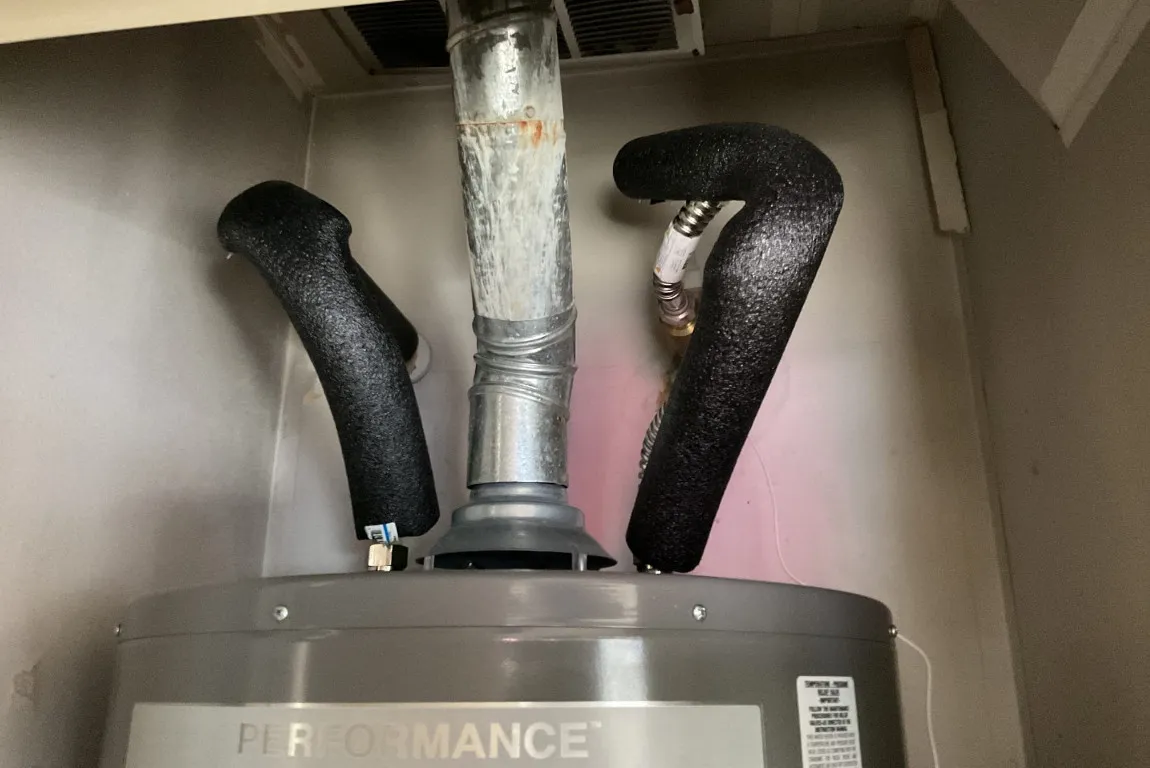
We asked our plumbing team to rank the primary causes of water heater damage in DFW households. They created a list of 6 key drivers of water heater malfunctions, leaks and general repair needs — your issue is likely caused by one of them.
Sediment buildup
The #1 cause of all Dallas-Fort Worth water heater damage, long-term issues and repairs. Water hardness directly contributes to most inefficiency, blockage and water pressure concerns.
Most mineral scaling and sediment buildup in water heaters can be eliminated by installing a whole house water softener system.
{{best-water-softener-brands="/blogs/best-water-softener-brands"}}
Corrosion
Corrosion is usually caused by long-term exposure to calcium and other hard minerals. It’s also prominent in older water heaters, with years of hard water exposure to its steel and glass components.
Old age
If your water heater’s over 10 years old, it’s reaching its natural life expectancy. If it’s over 15 years old, you’re past due for a replacement — even with excellent maintenance.
Thermal expansion
When incoming pressure is too high or water temperatures rise too far, thermal expansion occurs. Standard water heater tanks have nowhere to send that extra pressure, causing leaks and bursts.
Poor incoming water supply
If the water supply coming into your home either has poor water quality or improper pressure, it strains your water heater tank. Poor water quality adds mineral buildup, bacteria and other scaling elements to your tank.
When incoming water pressure is too high, it only adds to thermal expansion issues within the tank. Installing an expansion tank or pressure reducing valve (PRV) mitigates this issue.
Improper installation
Got a suspicion your old plumber did a bad job installing your tank? Don’t ignore your gut. Poor water heater installation is responsible for many issues and malfunctions.
Ask us to perform a water heater inspection and check for loose components, improperly opened valves, or faulty fuel sources and ignition parts.
3 More DFW-Specific Water Heater Problems
Dallas plumbing companies feature water heater repair above almost all of their service options. That’s because these service calls happen more frequently in North Texas than other regions.
So why are Dallas-Fort worth area homes so susceptible to water heater problems? Here are the 3 key reasons why.
Our homes are getting older
The average age of Dallas-Fort Worth area homes is nearly 36 years old. Most tank water heaters last 8-12 years with good maintenance, and up to 15 years when excellently maintained.
That means average DFW homes should be on their third or fourth water heater. Is that true for your home? If not, consider a new water heater — ask about an expansion tank to offset thermal expansion concerns.
{{water-heater-installation="/services/water-heater-installation"}}
Extreme temperature shifts
Dallas has 100 days of 100°F weather each year. We also see dozens of annual hailstorms and rapidly increasing freezing events.
These extreme temperature ranges put a strain on our water heaters. They suffer through massive thermal expansion in the summer, then are asked to deliver extra hot water in winter.
Clay soil erosion and hard water
There’s more sediment buildup and mineral scaling in Texas water heaters than in most areas of America. Our clay soil shifts, settles and erodes quickly, and some of that sediment ends up delivered to our tanks through the water supply.
Hard water minerals like calcium and limescale wreak havoc on water heater efficiency. Installing a water softener improves the quality of water in our tank systems, and lowers the necessity for future corrosion and leak repairs.
{{home-water-softener-savings="/blogs/home-water-softener-savings"}}
The 7 Most Common Water Heater Repairs in Our Area
Here’s an ordered list of the most commonly requested water heater repair service calls in DFW, based on 3 years of internal service data:
- Tank leaks
- Hard mineral scaling and corrosion
- Heating element issues (electric heaters)
- Burner issues (gas heaters)
- Thermostat problems
- T&P valve concerns
- Anode rod replacement
Cost Analysis: The Price of DFW Water Heater Repairs
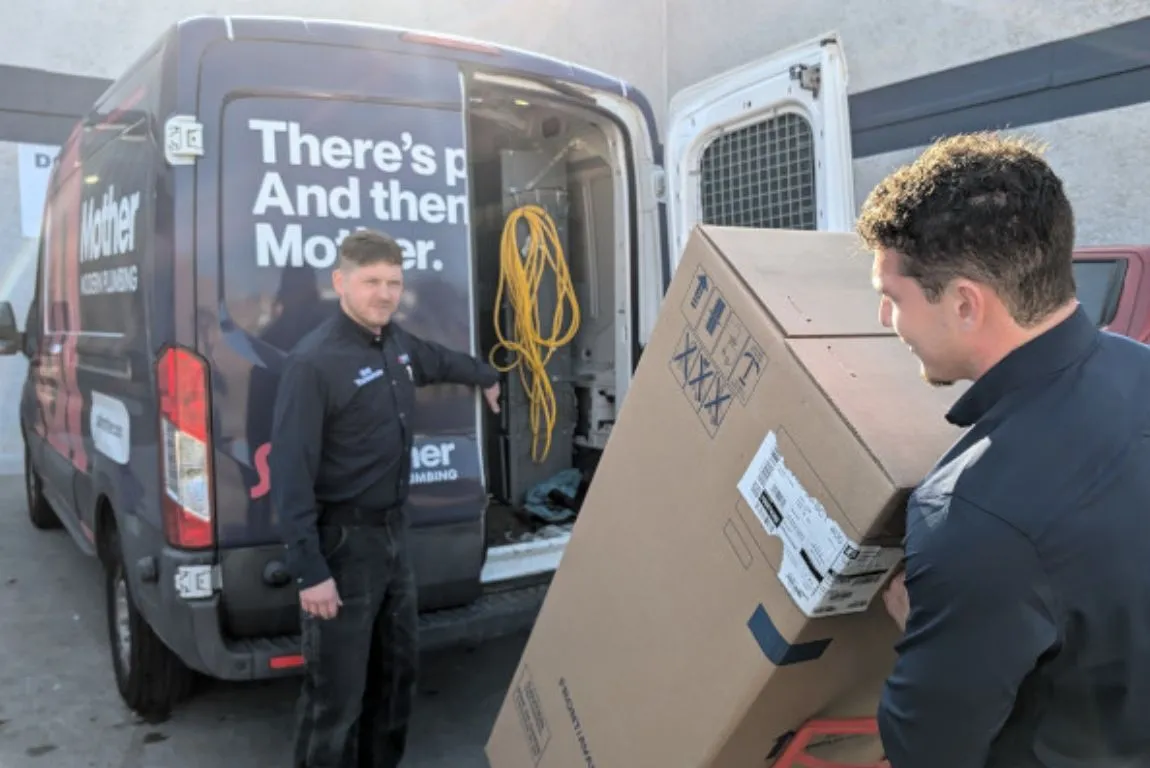
Knowing why your water heater issue is happening is certainly comforting. But we know what you’re asking now: what’s all this going to cost?
We compiled 4 years of residential service data in the DFW Metroplex to discover the true cost range of common water heater repairs.
TABLE: Average Cost of Home Water Heater Repairs in Dallas-Fort Worth
Major cost drivers of Dallas water heater repair
Labor is the biggest cost driver of Dallas-area water heater repair. Hourly rates run between $120-$300, depending on complexity of repairs.
Replacement parts and components aren’t the primary cost driver of local water heater service, but they create the most discrepancy in prices. A replacement anode rod can cost between $20-$50, while a replacement gas burner assembly costs $80-$250.
Tariffs also play a major role in the cost of water heater repairs. Our supply house and vendors have all notified us that prices will be going up 11-28% for replacement parts starting in May 2025.
Stress-Free Water Heater Maintenance Tips to Avoid Repairs
The best water heater repair appointment is the one you don’t have to schedule. Sure, we always love to hear from our customers — we just want it to be in positive circumstances as often as possible!
We asked our plumbing experts to create this list of water heater maintenance tips to reduce the odds you’ll need major repairs.
Schedule pro maintenance
We recommend our customers schedule a home water heater inspection once per year as part of their annual plumbing maintenance routine. Most homeowners choose to have us check their water heater and conduct annual drain cleaning services on the same day.
Join our Pipeline Membership program, and this service call is practically free. You get one pre-scheduled water heater flush and a $300 drain cleaning coupon per year — plus, no dispatch fees and a 16% discount on every job.
Regular flushing is crucial
Flush your water heater tank once per year to remove sediment, hard minerals and sulfate-eating bacteria from the system. If you have exceptionally hard water, flush every 8-9 months.
Regular flushing extends the lifespan of your tank water heater system and keeps rusty, discolored water out of your home.
Ask us to check your anode rod
During your annual water heater maintenance call, be sure to request anode rod inspection. It’s a quick process for our plumbers, and it ensures your tank stays clear of scaling issues and rust.
Insulate your water heater
If you’re handy, use a water heater insulation blanket and aluminum foil tape to add an extra insulation layer to your tank. You’ll prevent heat loss, lower your utility bills, and potentially extend the life of your unit.
Adjust the thermostat
Going on vacation? Ready to reduce hot water use for the summer? Lower your tank’s thermostat.
You’ll reduce standby heat loss, decrease energy per heating cycle, and minimize heat loss during water distribution. This all extends the lifespan of your water heater, plus reduces your utility bills while your thermostat’s set to a lower temperature.
How to Choose the Right DFW Water Heater Repair Service

A busted water heater affects every water using appliance in your home. It’s also a magnet for hard water, corrosion and sediment that cause costly leaks and home damage.
Now’s not the time to trust your repairs to an amateur plumber with lowball prices. You need lasting results, certified replacement parts and thoughtful service.
Here’s how to choose the right plumbers to fix your tank once, and fix it right.
Start your reviews and research with the BBB
Start your research with BBB accredited companies with A+ ratings. We’re proud of our A+ rating and local affiliation with the BBB serving the Heart of Texas.
Always choose a company licensed by the Texas State Board of Plumbing Examiners. Our License Number is RMP-43457.
Credible reviews of local plumbing companies are available all over the web. You can find ours on Angi, Yelp, Home Advisor and Facebook.
Real DFW homeowners review Mother water heater service calls
“Great job replacing our water heater. It leaking this morning when we woke up and Mother Modern had a master plumber to our home that morning and we had a new water heater installed by this evening. Highly recommend.”
“Josh did a great job with all our plumbing needs. In fact he was so good, we ended up buying their year long service plan, which includes flushing out our water heaters annually, and a discount on future plumbing. Very impressed with his knowledge and respect of our home.”
“Mother plumbing did an amazing job for us - we moved into a new house and discovered a gas leak in the water heater. They were out within an hour to identify the spot of the leak and repair with a new line. Thank you!”
“Steven and his team were able to replace our water heater in a very timely fashion and were able to save us money by getting our water heater covered by the warranty. They were very professional and did a great job! We’ll definitely be return customers when needed.”
– Amanda Flachsbart
8 great questions to ask during your estimate
Ready to hire a DFW plumbing company for your water heater repairs? We certainly hope you choose Mother, but we understand that due diligence is important.
Be sure to ask any local plumber these 8 questions during your estimate. You’ll get a good sense of their professionalism, experience, and communication skills. And you’ll also find out whether they intend to use original or aftermarket parts.
- Can you show me proof of your active license and insurance?
- I have a (gas or electric) water heater. What is your direct experience repairing my type and brand of unit?
- Do you charge a diagnostic fee? If so, how much is it?
- Can you provide a detailed explanation of the problem and the proposed repair options?
- Are you going to use original equipment manufacturer (OEM) parts or aftermarket parts for my repair job? Why?
- How long do you anticipate the repair will take?
- Can you provide a single point of contact for this project?
- Do you offer any warranties on your labor or the parts you install? If so, what is the duration and what does it cover?
Conclusion
Most Dallas-Fort Worth water heater repairs are caused by sediment buildup and corrosion caused by our local hard water. The most frequent service calls are for tank units with leaks, mineral scaling and faulty heating elements.
Expect to pay $65-$155 per hour for labor costs, plus the cost of any replacement parts or components. A reputable plumber provides all pricing and timeline data in an easy to read contract, and offers a single point of contact for easy, clear communication.
Choose Mother for modern plumbing repair focused on long-term solutions and current technology. Our certified water heater specialists offer expert service throughout the Dallas-Fort Worth Metroplex.
Simple pricing, quality parts, master plumbers, and honest business. That’s the Mother promise.
{{water-heater-installation="/services/water-heater-installation"}}
Common Q’s about Water Heaters
Can I get a tax credit for a tankless water heater?
Yes, natural gas tankless water heaters installed between 2023 and 2032 are eligible for the EnergyStar Energy Efficient Home Improvement Tax Credit. It covers 30% of the total installation cost up to $600. ENERGY STAR rated tankless water heater models with ≥ 0.95 UEF are eligible.
Are tankless water heaters more efficient than tank water heaters?
Yes, the U.S. Department of Energy reports that tankless water heaters are up to 34% more efficient than tank water heaters. That's because tankless heaters don’t store water. Instead, they heat water on demand and only when needed.
What are the most common water heater tank repairs?
A majority of conventional water heater tank repairs involve these six components:
- Thermostat
- Burner (heating element)
- Pilot light
- Anode rode
- T&P valve
- Leaks due to tank corrosion or scaling


